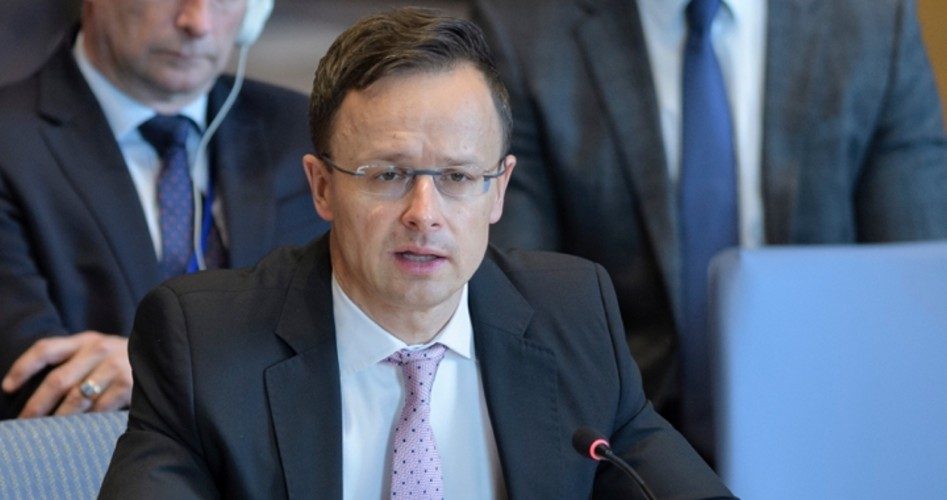
During a United Nations conference on counter-terrorism in Vienna, Austria, Hungarian Foreign Minister Péter Szijjártó branded the mass migration plan championed by the UN a “serious threat” to humanity. The foreign minister (shown here in another UN venue) observed that the UN should spend more of its resources on fighting global terrorism and shift resources from its mass migration schemes to do so.
“We are calling on the UN to include the fight against terrorism in its budget, to spend more on the global fight against terrorism and less on migration, for the benefit of all the world’s citizens,” Szijjártó said.
While no one should actually want the UN to take any role in the global fight against terrorism (or anything else involving the use of force), Szijjártó makes a good point. With its current migration scheme, the UN Global Compact for Migration, the UN is exacerbating the problem that its counter-terrorism conference professes to address by attempting to, essentially, legalize illegal immigration, albeit in non-binding form.
Szijjártó pointed this out himself in 2018: “The goal of the UN Global Compact for Migration is to legalize illegal immigration, which is totally unacceptable and violates the sovereignty of member states, including that of Hungary.”
When the compact was ratified in December of 2018, only five nations — the United States, Hungary, the Czech Republic, Poland and Israel — voted against it. Twelve nations including Australia and Italy abstained.
Szijjártó went on to point out the link between mass migration and at least 30 separate terror attacks since the 2015 migrant crisis in Europe. The Hungarian Foreign Minister laid out several steps, which he believes would restore European security. Those steps included the defeat of ISIS, strengthening national borders, supporting communities which are escaping terrorism and asking the United Nations to recognize terrorism as a threat to be confronted.
Well over a thousand European citizens have been killed by so called asylum seekers since 2014.
The minister rightly said that the UN’s funding and encouragement of mass migration posed “a very serious threat to the whole of humanity.”
Szijjártó has also been highly critical of EU policy on migration. In September of last year, he claimed that the EU was trying to “cram mandatory migrant quotas down the throats of European countries.”
There has been a lot of pressure on Hungary and other member states on the EU’s external border to relax border controls and allow migrants to flood across the border. In March of last year, German Chancellor Angela Merkel even said, “Member states on the external border of the EU must give up their national competencies in order to give Frontex [the EU’s border and coast guard agency] truly comprehensive competencies.”
The EU has been threatening to impose punitive sanctions on Hungary over its strict immigration policies since 2015, when the migrant crisis began.
But, thus far, Hungary has held strong, even constructing border fencing on its southern border in contravention of stated EU policy. And it worked, with the flow of illegal immigrants dropping from nearly 140,000 in 2015 to approximately 5,000 a year currently.
But Szijjártó has also pointed out that the UN policy is far more dangerous due to its ambitious global reach. “The UN compact is more dangerous, however, because it has a global initiative, meaning it will have a greater effect than [European] policy and represents a risk a risk to the whole world.”
The United Nations holding a conference on how to address terrorism is akin to a farmer addressing the escape of his livestock. It’s just common sense that one of the solutions to stopping terrorism or the escape of livestock would include closing the gate. Yet, in the UN’s case at least, this solution is never even considered.
It seems like the most common-sense reasoning about unchecked immigration is coming from places like Hungary, Poland and the Czech Republic. Why would this be so?
Perhaps, it’s because they are places which used to be under the ruthless control of an entity outside their own borders, the Soviet Union. Maybe they are extra sensitive to the notion that such a thing could happen again, this time under a globalist organization like the United Nations.
Photo of Hungarian Foreign Minister Péter Szijjártó: United Nations
James Murphy is a freelance journalist who writes on a variety of subjects, with a primary focus on the ongoing anthropogenic climate-change hoax and cultural issues. He can be reached at [email protected].



